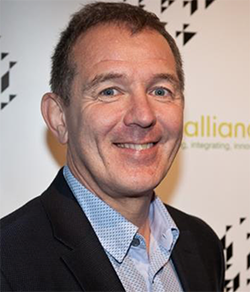Skill Mix: How paramedics can help General Practice
http://www.gponline.com/skill-...
By Dr Mark Spencer on the 25 May 2016 8 comments
Dr Mark Spencer, co-chair of the New NHS Alliance, employs a paramedic in his practice. He explains what the role involves and how it benefits the practice.

Paramedics are fleetingly mentioned within Dr Arvin Madan’s introduction to the recently published GP Forward View. They are also included again in the ‘Ten High Impact Actions’. Blink, though, and you would miss those references.
So, what is their role and what are they currently doing within day-to-day general practice?
At FCMS, the healthcare provider of which I am medical director, we have had paramedics filling urgent care shifts for over a decade. Way back in 2002 we were awarded the Health and Social Care Award in the emergency care category for our development of a multidisciplinary team in the GP out-of-hours setting. The team included GPs, primary care nurses, mental health nurses, pharmacists, dentists, social workers and paramedics.
So, what about ‘in-hours’ GP practices?
The past two years has seen my own practice move from predominantly GP dominated provision of day-to-day appointments, to a more multidisciplinary approach. Practices nurses have stepped up the mark for the provision of care for patients with long-term conditions, but seeing patients who request an appointment has, until recently, pretty much remained the domain of the GP.
Thinking differently
Our change came out of adversity and need. In the past two years we have lost two whole-time equivalent GPs as four part-time partners either retired or moved on. This meant we were only left with four whole-time equivalent GPs for over 12,000 patients in an area of high deprivation and high demand. Failure to recruit new GPs left us with no alternative but to think differently.
We developed a strategy that includes an acute access team, led by an on-call GP, but with the bulk of face-to-face delivery being undertaken by a full-time nurse practitioner, a full-time clinical pharmacist and a full-time paramedic.
Our paramedic has three basic elements to his job. First, he carries out a morning minor ailments surgery, working alongside, and being supported by, the other members of the acute access team. Late morning he then sets off on home visits, covering the vast majority of acute visits that would otherwise have been undertaken by a GP.
Use of technology
The use of telephone support, but more importantly, video support between the paramedic and the on-call GP, has significantly broadened the range of conditions that can safely be managed by the paramedic, with the on-call GP remaining back at surgery. The live video link allows the GP to see the patient, and also allows the patient and carers to interact directly with the GP as if they were in the room.
To date, the feedback from patients and carers has been excellent. To cover information governance, the patient signs a written consent form prior to, and immediately after, the video consultation. We have also had written confirmation from our local coroner that they would accept a death certificate from the GP following a video consultation should the patient pass away, in exactly the same way as they would if the GP had visited in person.
Releasing the GP from having to undertake acute visits has not only freed up a considerable amount of GP time, but has had a substantial effect on reducing GP stress levels.
Anticipatory care plans
The third element of the paramedic’s job is producing anticipatory care plans for complex patients deemed to be at risk of acute hospitalisation.
We have over 300 active care plans, which not only assist the patient and carer with self-care, but also advise other healthcare professionals on patient management in the event of acute illness.
One of the main recipients of this guidance is the attending paramedic following a 999 call by the patient. Our care plans are written by a paramedic, for a paramedic. I believe this is a major step forward for us all.
The only issue we have with paramedics working as autonomously as possible within the multidisciplinary team is that they are unable to undertake prescribing accreditation. This bar on paramedics should surely be urgently addressed if we are to make full use of their skills.
We took the step of employing a paramedic out of need at a time of adversity. All in all, it has been a great leap forward not only for the survival of my practice, but for how we will deliver multi-disciplinary general practice in the future.
Would I give up the paramedic if new GPs suddenly became available? Absolutely not.
- Dr Mark Spencer is a GP in Fleetwood, Lancashire, medical director of FCMS and co-chair, New NHS Alliance
Paramedics, clinical pharmacists and physician assistants will discuss their roles at the RCGP Annual Conference 2016. See session G2: www.rcgpac.org.uk
